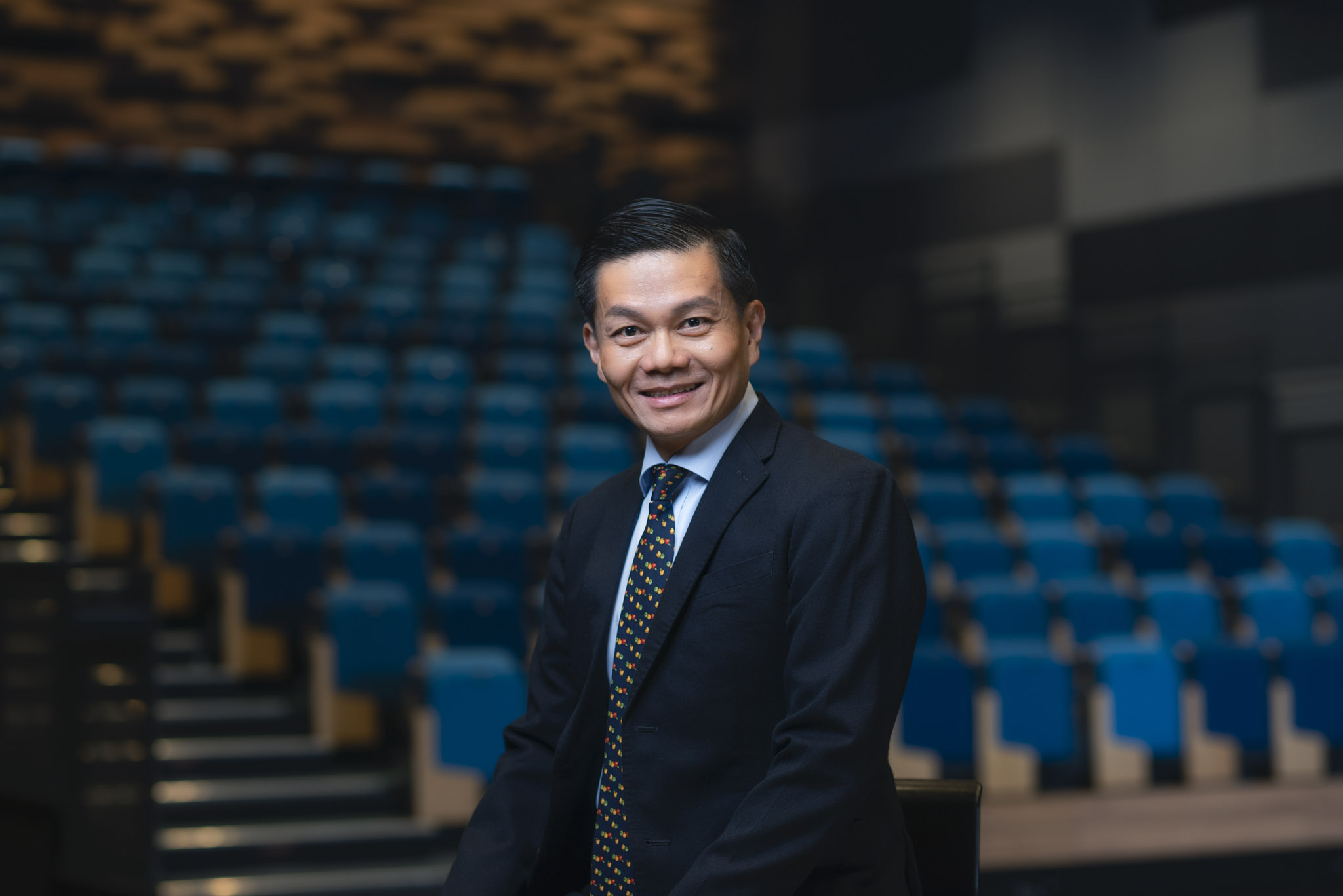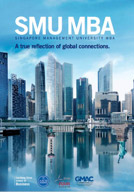
Imparting knowledge to future generations, Dr Ang Ser Keng, Academic Director of the SMU MBA and IE-SMU MBA programme as well as Vice Chairman of Executive Committee & Director, UOB-SMU Asian Enterprise Institute, talks about his past and how it has made him the man he is today.
The 26th US president Theodore Roosevelt once said, “The boy who is going to make a great man must not make up his mind merely to overcome a thousand obstacles, but to win in spite of a thousand repulses and defeats.”
This adage rings especially true for Ser Keng.
GROWING UP
While the biggest struggles for many young Singaporeans revolve around competing for the top spot in school or mastering Machiavellianism in the workplace, for Ser Keng, whose parents were migrants from China, the challenges were a lot more hard-hitting.
“Growing up was tough, family circumstances then did not permit my parents to go to school, and growing up in such an environment meant that we always had to make ends meet. As such there wasn’t much of an aspiration or a dream.”
His parents, who were illiterate, prioritised their children’s education with the minimal means that they had. While his peers were lamenting the number of tuition classes they had to attend or debating their options for tertiary education, Ser Keng was fighting for a chance to continue his studies beyond secondary school instead of immediately joining the workforce — which was what his siblings had to do to support the family.
“Things took a turn when I decided that our lives were in our own hands,” says the investment-banker-turned-academic.
“If we worked hard enough, we could achieve what we want.”
THE WORLD OF BANKING
Instead of simply taking the path most travelled, Ser Keng wanted to make a difference. He defied the odds of his circumstances and graduated with a degree in accounting, before taking on a job as an accountant in an investment bank.
However, having already overcome major obstacles to become a graduate with a stable job meant that Ser Keng was not one to be content with merely going along with the ebbs and flows of life. Instead of banking on his degree and area of specialisation, he soon realised that his initial dream of becoming a partner in an accounting firm had rapidly evolved.
“Frankly, one’s idea of a dream job changes as we grow older, and hopefully, wiser. A dream job is never going to be a perfect job because there is no such thing,” muses the holder of a doctorate in Finance from the University of New South Wales.
Having experienced first-hand the rush of investment banking at his first job, he discovered that his next aspiration was to become an investment banker with an international career. Making the transition from the accounting department to the ranks of investment banking, however, was not as simple as putting in a transfer request.
“I had to fulfil that dream that by quitting my job, taking up a huge loan, and moving to London to study for my MBA,” says Ser Keng.
The massive gamble of sacrificing a stable job for the unknown, thankfully, paid off. Ser Keng went on to spend most of his eight years in investment banking abroad — in the world’s financial hubs of London and Hong Kong. While the notion of a jet-setting, high-flying job might have been the pinnacle of success for some, it took a toll on Ser Keng over the years.
“My family was residing in Singapore so I had to commute every weekend back to Singapore to spend time with them,” recalls the award-winning academic.
“And as I was the senior banker covering the North-Asian markets, I also had to travel to those markets on weekdays. There was just too much traveling.”
FROM BANKING TO ACADEMIA
Ser Keng readily admits, teaching was never part of his career plan as a young, adrenaline-fuelled corporate climber. But he soon realised that the fast-paced life of an investment banker was not quite sustainable when he started a family of his own.
“When my son was five, I decided to hang up my boots for investment banking, relocate to Singapore, and explore doing something different,” says Ser Keng, who was then a senior vice-president at an international bank.
“I was asked to help teach several courses at SMU and fell in love with teaching. It has been 14 years, and I am still in love with teaching because I love learning.”
Besides his years of experience in the industry, Ser Keng has also spent more than 20 years actively investing on his own — which saw at least four financial crises that he had to navigate. He leveraged upon these real-life experiences to shape his interactions with students, and to go beyond textbook-based curriculum to illustrate investing philosophies and help students gain an insider perspective into financial markets.
“I must emphasise that theory is important in the classroom,” says Ser Keng.
“This is because it provides the rigour and knowledge to nail problems in a systematic manner. That said, if we follow a theory blindly, it may lead to us to the wrong decisions. This is when and where industry knowledge helps us stay rooted to reality.”
For example, companies are usually guided by a theoretical framework called a “pecking order” to structure its capital. The framework suggests that equity is the least favoured option because it is the most expensive source of financing. However, in practice, when the financial markets are in overdrive and stocks are trading at historical highs, perhaps issuing equity should be the first choice because one would be able to minimise dilution from issuing equity at a high price, cites Ser Keng.
Lessons like these have to be gleaned through faculty who have the relevant experience, as well as through first-hand experiences by students in the industry. As such, Ser Keng has refined the MBA curriculum to prepare students for such scenarios in the fast-changing financial world.
For starters, Ser Keng believes that every business is a digital business — companies are either disrupters or being disrupted by digitisation. As such, LKCSB is including as one of its core offerings a course called Leading Digital Transformation to enable graduates to lead the digital revolution.
Coming from a strong international corporate background, Ser Keng also recognises the benefits of immersion in a globalised economy, and has incorporated the option for MBA students to either embark upon a full-term exchange programme with a partner university or work on real-life consulting projects under a new curriculum.
“Finally, being a leading Asian business school, we believe that our MBA students should get first-hand experience on understanding the Asian environment much better,” adds Ser Keng.
As such, full-time MBA students will also have the opportunity to work on a student-led project that has a social and/or business impact, in an overseas market. This would be the Overseas Immersion Programme (OIP), which is another unique feature of LKCSB’s new MBA programme.
MAKING A DIFFERENCE
Above all, Ser Keng hopes that a student’s experience at SMU will not only provide a strong academic foundation, but also a compass for navigating the meandering journey of life.
“To the next generation, I would like to share with them that there are no free lunches,” says Ser Keng.
“There is no such thing as maximum outcome with minimum effort. As you progress in your lives and careers, aspire to do things that are right, meaningful and impactful. Be a role model to others — your children, colleagues and friends, and remember to be of service to the community. It is only then that we can say that there is meaning to life.”
Speak to our Admissions Advisors
Singapore Management University
Lee Kong Chian School of Business
Graduate Programmes Office, Level 4
50 Stamford Road, Singapore 178899
Tel: +65 6828 0882
Join us at the upcoming events
Kyobashi, 1 Chome−3−5 三井ガーデンホテル 1F
Chuo City, Tokyo, 〒104-0031, Japan
1 Raffles Drive, Makati Avenue, 1224, Makati City
You may also be interested in
Executive Master of Business Administration (EMBA)
